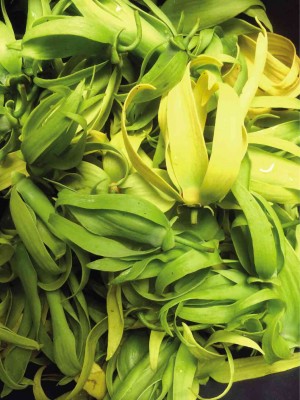Ylang-ylang industry in Pangasinan eyed
AGUILAR, Pangasinan—A group of investors recently visited a mountain village here to find out if it is suitable for the ylang- ylang plantation and extraction facility that it plans to put up.
“There’s a big demand for ylang-ylang in the world market, especially in France. The ylang-ylang variety in the Philippines is the best in the world,” said Fred Reyes, owner of Chemworld, one of the country’s leading perfume distributors.
“Unfortunately, the world’s biggest producer is Comoro Islands (an archipelago of volcanic islands off the southeast coast of Africa), and the ylang -ylang variety grown there came from the Philippines,” he said.
Reyes, who was accompanied by Pangasinan Rep. Leopoldo Bataoil, held a dialogue with village officials and farmers during his visit to Sitio (settlement) Mapita, a mountain village of Laoag here.
The village is home to about 1,000 indigenous peoples belonging to the Kankanaey, Ibaloi and Bago tribes.
Reyes said this village’s advantage was its elevation and good weather.
“We are looking at putting up a model we saw in Thailand, which is a combination of a plantation with eco-resort,” he said.
Reyes said his group was also attracted by the presence of 800 hectares of land that could be made available by the Department of Environment and Natural Resources (DENR) through a grant.
The country’s leading ylang- ylang producer is Anao town in Tarlac province, which produces 36 liters of essential oil a year.
“But the trees there are so tall. It’’s not the right way to grow ylang ylang for extraction,” Reyes said.
He said ylang-ylang trees should not be more than six feet tall so it would be easier for the flowers to be harvested.
Bataoil said with the ylang- ylang plantation in the village, residents would have an additional source of livelihood.
“Production of ylang-ylang oil is a community effort. No one will be dislocated, no one will be relocated, they will stay where they are and they will plant in their own property and in places the DENR will designate,” Bataoil said.
An ylang-ylang tree produces an average of 3 kilograms of flowers a week.
A kg of ylang-ylang costs about P60.
Reyes said having a company engaged in the distribution of fragrances in the country was a distinct advantage.
“We have several perfume companies as our principals and they are our market. So we have the market, which is always the component lacking in projects like this,” Reyes said.















